- Home
- McBain, Ed
Bread (87th Precinct) Page 11
Bread (87th Precinct) Read online
Page 11
“Oh,” Kissman said, surprised. “So you’re Hawes, huh?”
“What do you mean?” Hawes said, puzzled.
“I was going to call you later today, soon as I got relieved. We’ve got the apartment bugged, I’ve been sitting the wire.”
“Oh,” Hawes said. “You got my message, huh?”
“Loud and clear. And I got the conversation you had with her later, after Harrod was killed. They knew the joint was wired, huh? I should have realized it. We thought the phone mike went dead, but that didn’t explain the waterfall whenever anybody was talking in the kitchen. I told the lieutenant they’d tipped, that the only time they said anything they didn’t want us to hear was in the kitchen. Everything else was either phony leads or routine garbage, like where they planned to go that night, or what they were buying for dinner. I also got some very sexy tapes from the bedroom mike, if you know anybody who’s interested.” Kissman grinned, pulled a pipe and tobacco pouch from the pocket of his sweater, and began filling the pipe.
For the first time, Hawes noticed the holes burned in Kissman’s sweater. Hawes’s father had smoked a pipe, and there were always burn holes in his sweater, not to mention the carpet, the furniture, and on several occasions the drapes. To make matters worse, the Hawes family had owned a Siamese cat with a penchant for eating wool. There had been no valid excuse for that animal’s appetite; she was not pregnant, she had no vitamin deficiencies of which Hawes was aware, she was simply a voracious wool-eating beast. What the coals from his father’s pipe did not accomplish, the cat did. Hawes’s mother once said to his father, “You look moth-eaten all the time.” His father had looked up in surprise and said, “What do you mean, Abby?”
Hawes realized he was smiling only when Kissman, still loading the pipe, said, “Something?”
“No, no,” Hawes said, and shook his head. “Why’s the place wired?” he asked.
“We knew Harrod was a junkie, and we suspected he was a pusher as well. We were trying to get a line on the big boys.”
“Any luck?”
“Not so far. Harrod sent us on wild-goose chases all over town. That’s one of the reasons I figured he’d tipped to the bug. But the lieutenant said no, so who’s going to argue with a lieutenant?”
Kissman struck a match and began puffing great clouds of smoke into the kitchen. Neither of the two men so much as glanced at the unconscious girl. They both knew an ambulance was on the way, and there was nothing they could do for Elizabeth right now—except try to discover who was responsible for her present condition. Besides, there is a curious detachment about police officers confronted with the results of bloody mayhem. Like surgeons performing an operation—the hole in the surgical sheet circumscribing the area of surgery, the rest of the body covered, the lung or the liver or the brain becoming a part somehow isolated from and unrelated to the whole—detectives will often dissociate the victim from the crime itself, throw a sheet over the body, so to speak, so that they can concentrate completely on the specific part requiring their full attention. Elizabeth Benjamin lay hurt and bleeding on the kitchen floor, and the ambulance was on the way, and now the detectives discussed the who’s and why’s and wherefore’s with all the detachment of surgeons peering into an open heart.
“The first I heard of Harrod’s murder,” Kissman said, “was when I picked up the conversation with you and the girl earlier today. You know what I thought? I thought, Great, there goes a lot of hard work up the chimney.”
“Were you listening when the girl called me later?”
“Picked it up on the bug there under the cabinet. Just her side of the conversation, you understand. Then I picked up the glass smashing, and I heard these guys busting in on her, and her screaming, and I rushed right over. I’m staked out in an apartment in the next building; we ran our wires up over the roof and then down the back side. Took me maybe five minutes to get here. I found the girl just the way she is. Whoever broke in had gone out again, probably the same way. At least, I didn’t meet anybody coming down the stairs on my way up. The cars got here maybe two minutes after I did. You the one who sent them?”
“Yeah,” Hawes said. “I didn’t think I could…”
“There she is,” someone at the door said, and Hawes turned to see two ambulance attendants and what he assumed was an intern coming into the room.
The intern bent quickly over Elizabeth, his eyes darting from her bruised and bleeding face to the hanging jaw, over the ripped front of her jersey top and the purple marks on her exposed breasts, and then down to the obviously broken legs. The ambulance attendants put down their stretcher and lifted her gently onto it. Elizabeth moaned, and the intern said, “It’s all right, dear.” He was perhaps twenty-five years old, but he sounded like a man who’d been practicing medicine for sixty years. One of the attendants nodded to his partner, and they picked up the stretcher again.
“How does it look?” Kissman asked.
“Not so great,” the intern replied. “If you want to check in later, I’m Dr. Mendez, Diamondback Hospital.”
“Think we’ll be able to talk to her?” Hawes asked.
I doubt it, that jaw looks broken,” Mendez said. “Give me a ring in an hour or so.” The attendants had already left the apartment. Mendez nodded curtly and followed them out.
“The girl said you’d been in here a few times,” Hawes said. “Was she right?”
“Right as rain,” Kissman said. “Came in six times altogether.”
“She said four.”
“Shows how careful we can be when we want to,” Kissman said. “We were all playing a little footsie here. Harrod knew the place was bugged and gave us false leads, and we came in four times that we let him know about, but two more times without letting him know.”
“Find anything?”
“Nothing. Took off all the switch plates, searched the toilet tank, the bedsprings, the ceiling fixtures, you name it. Only place he could have hidden any dope was up his rear end.”
“How about those locked file cabinets in the darkroom?”
“What file cabinets?”
“Under the counter in there.”
“Those must be new.”
“When were you in here last?”
“About a month ago.”
“Let’s bust them open now,” Hawes said.
“I’ll see if the guys downstairs have a crowbar,” Kissman said, and went out.
Hawes walked over to the window. The glass had been completely smashed out and the box of geraniums had been overturned, the soil scattered over the windowsill, the uprooted flowers knocked into the room and onto the floor. Not four feet from the broken window, Elizabeth Benjamin’s blood stained the linoleum. Hawes stared at the blood for a long while, and then went to the phone and dialed the squadroom.
Carella picked up on the third ring. “Where the hell are you?” he said. “I go down the hall for a minute, and the next thing I know you’ve vanished.”
“Didn’t Dave fill you in?”
“Dave got relieved more than an hour ago. Nobody ever tells me anything,” Carella said.
“Somebody broke in on the Benjamin girl and roughed her up,” Hawes said. “She was on the phone with me when it started. I ran right over. I found out who planted the wire up here, Steve. A guy named Kissman from Narcotics.”
“Right, I know him,” Carella said. “Alan Kissman, right?”
“Martin Kissman.”
“Martin Kissman, right,” Carella said.
“Did I tell you Ollie Weeks called?”
“No.”
“You must’ve been down the hall. The ME told him Harrod was killed by several people armed with an assortment of weapons. He was a junkie, Steve.”
“Is that why Kissman had the place wired?”
“Right. We’re going to bust into these locked file drawers as soon as he gets back with a crowbar. What’s going on up there?”
“Nothing much. Nothing connected with this, anyway.”
> “You think we should run our own check on Worthy and Chase?”
“What do you mean our own check? Who else is running one?”
“Ollie Weeks. I thought I told you that.”
“I must’ve been down the hall. What’s your reasoning, Cotton?”
“My reasoning is if Harrod had tread marks running up and down both arms, his bosses should have noticed, especially in the summertime with short-sleeved shirts. But all they could tell me was that he took pictures for them. Maybe Ollie’s right. Maybe the development company is a front.”
“For what?”
“Drugs? Kissman thinks Harrod was a pusher.”
“Even if he was, that doesn’t mean Worthy and Chase knew anything about it.”
“Then why didn’t they tell me he was a junkie? He’d just been killed. What were they protecting?”
“I don’t know. But let Ollie do the digging for us. One thing we don’t need right now is more work.”
“I don’t like Ollie,” Hawes said.
“Neither do I, but…”
“Ollie’s a bigot.”
‘That’s right, but so’s Andy Parker.”
“Yeah, but I have to work with Parker, he’s on the goddamn squad. I don’t have to work with Ollie.”
“He’s a thorough cop.”
“Hah!” Hawes said.
“He is. There’s a difference between him and Parker.”
“I fail to see it.”
“There is. It’s the difference between crab grass and dandelions. Parker is the crab grass, ugly as hell, and absolutely good for nothing. Ollie’s the dandelion…”
“Some dandelion,” Hawes said.
“A dandelion,” Carella insisted. “Just as ugly as the crab grass, except when it blooms a pretty yellow flower. And don’t forget, you can put it in a salad.”
“I’d like to put Ollie in a salad,” Hawes said. “And drown him with oil and vinegar.”
“Let him handle the legwork, Cotton. Did he say he’d be in touch?”
“He should be showing up at the squadroom any minute now. You know what I wish? I wish Artie Brown is there when he starts spewing some of his racial horse manure. Artie’ll knock him on his ass and send him gift-wrapped to his uncle in Alabama.”
“Why’s he coming up here?” Carella asked.
“He thinks I’m on my way in with the Benjamin girl. Tell him what happened, will you? Maybe he’ll go right back home and stick pins in his little Sidney Poitier doll.”
“How bad is the girl?”
“Pretty bad. Looks like they broke her jaw and both her legs.”
“Why?”
“I don’t know. Here’s Kissman now, I’ll talk to you later. Are you heading home?”
“In a little while.”
“I think we’d better meet on this later tonight, Steve. It’s getting complicated.”
“Yeah,” Carella said, and hung up.
There is hardly anything you can’t open with a crowbar, except maybe a tin of anchovies.
Hawes, Kissman, and Detective Boyd of the Eight-Three utilized a sort of nonstop approach in prying open the locked drawers in Harrod’s darkroom. Instead of prying one open, and then examining its contents, they opened the entire lot en masse, six drawers in all, and then sat down to examine the contents at their leisure. It took them ten minutes to open the drawers, and nearly an hour and ten minutes to go through the contents. Because the only light in the darkroom was furnished by the red bulb hanging over the counter, they carried all six drawers into the bedroom, and turned on the overhead fixture, and sat among and between the drawers like kids rummaging through old furniture and clothes in the attic of an old house on a rainy day. Outside, the street noises began to diminish—this was the dinner hour in Diamondback.
Charlie Harrod had been a busy person.
So had Elizabeth Benjamin.
Part of Harrod’s busy-ness had to do with the taking of drugs. If there had been any doubts left by the medical examiner’s report as to whether or not Charlie had been an addict, these all vanished when the detectives went through the contents of the first drawer. In an empty cigar box in that drawer, they found a hypodermic syringe, a teaspoon with the bottom of the bowl blackened and the handle bent, and half a dozen books of matches. Hidden in the barrel of a two-cell flashlight, they found three glassine bags of a powdery white substance they assumed to be heroin. In a second empty cigar box in that same drawer, and presumably kept as insurance against hard times, they found a safety pin, an eyedropper, and a sooty bottle cap fitted into a looped piece of copper wire. The bottle cap was a makeshift spoon, used to heat and dissolve the heroin with water; the safety pin was used for puncturing the vein; the eyedropper was used for injecting the drug into the bloodstream—very primitive, but very effective if the monkey was on your back and your syringe was broken and you’d run out of kitchen utensils.
Further back in the drawer they found a collection of books, pamphlets, and magazine and newspaper clippings relating to drugs and drug abuse, including one reprinted from the monthly police magazine to which most cops in the city subscribed. A separate manila folder contained a file of newspaper clippings reporting seizures of large shipments of heroin, arrests of pushers, police drives against the narcotics traffic, and what appeared to be a page Xeroxed from a text on toxicology, outlining the symptoms of alkaloid poisoning and its antidotes. There was nothing in the first drawer to indicate that Harrod had been dealing. The stash of heroin was minuscule, the amount an addict might normally keep on hand to avoid running short. Whereas the law in this city stated that possession of more than two ounces of heroin created rebuttable presumption of intent to sell, none of the detectives believed there was enough dope hidden in Harrod’s flashlight to support such an allegation.
The remaining five drawers were packed with manila folders, labeled and cataloged alphabetically. From the way each of the separate manila folders was labeled, one might have suspected that the late Charlie Harrod’s tastes had run to matters literary, theatrical, mythological, historical, linguistic, instructional, and religious. A sampling of the white labels pasted to the tabs on the folders revealed, for example, such diversified titles as SNOW WHITE AND THE SEVEN DWARFS, and LASSIE, and THE TROJAN WARS, and INFANT AND CHILD CARE, and THE GOLDEN FLEECE, and TARZAN OF THE APES, and THE JOYS OF YIDDISH, and ZOO STORY, and THE BERLITZ SELF-TEACHER (French), and WAR AND PEACE, and THE RISE AND FALL OF THE THIRD REICH, and even the HOLY BIBLE. One look at the contents of the folders, however, revealed what the titles really meant, and showed besides that Charlie Harrod had possessed a certain perverse sense of humor-The folders contained photographs.
Some of the photographs were obviously recent and had probably been taken by Charlie himself, here in his own apartment—in the bedroom primarily, but also in the living room, the kitchen, and (in one remarkable series) on the fire escape outside. Some of the photographs were enlarged prints of pictures taken decades ago—the costumes identifying the separate eras, telltale cracks, rips and fade marks indicating sources other than Charlie’s own camera.
All of the photographs were pornographic.
They depicted every conceivable sex act ever committed, devised, or imagined by and for humans and animals of every age, color, stripe, or persuasion in duets, trios, quartets, quintets, sextets (of course), crowds, mobs, tribes, or (as it seemed in one of the pictures) entire nations—performed with or without restraints, mechanical appliances, tools, gadgets, instruments of torture, or benefit of clergy. Since all of the photographs were marked with price tags, it was reasonable to assume that Charlie had been something more than a casual collector. In fact, it was almost mandatory to assume that Charlie’s expensive clothes and automobile were direct residuals of his penchant for photography. An important part of his busy-ness then (or business, if you prefer) was the peddling of porn. Nor had Elizabeth Benjamin been lying when she’d stated she was not a hooker. Elizabeth Benjamin was a photographer’s model. At
least two-thirds of the pictures in Charlie’s gallery featured Elizabeth as performer in a variety of roles. Her repertoire was apparently unlimited, her poses unselfconscious and unabashed, her star quality evident.
And so the dinner hour passed pleasantly, and dusk settled on the city as Kissman, Boyd, and Hawes spent a quiet interlude looking at dirty pictures, each man knowing at last what it felt like to be a member of a censorship board who, compelled to read all sorts of filthy books in the service of the community, finally determines which of those are too vile to be permitted space on the shelves of the public library.
The experience was purifying.
Steve Carella was beginning to feel like an accountant.
It was now twenty minutes to 8:00, and Ollie Weeks had arrived at the squadroom almost two hours ago with quite a bit of information on the firm called Diamondback Development, Inc., run by two gentlemen named Robinson Worthy and Alfred Allen Chase. Ollie had apparently done some thorough digging since the time he’d left Worthy and Chase with a promise to look into their company operations and the time he’d phoned Hawes to say, “I found out a few things about our friends Worthy and Chase,” a choice bit of meiosis, if ever there’d been one. Actually, Ollie had done some fine and fancy footwork in those few hours before most business offices closed for the day, proof positive that fat men are light on their feet and good dancers besides.
He had, of course, been running his case by the book, and the book dictated that certain things be done as a matter of form in the investigation of a suspect business operation. Ollie had done them all, and he was now anxious to prove to Hawes (or to Carella as his substitute) that he had not been overly hasty in his judgment of the men who ran Diamondback Development. He knew Carella from a case they had worked jointly some five years back, at which time Carella had called Ollie on his peculiar idiosyncrasy of referring to an eighty-six-year-old Puerto Rican matriarch, grandmother to twelve children, and proud parent of a son who was then running for the City Council, as “that decrepit spic twat.” Ollie had taken offense at Carella’s having taken offense, and the working relationship had been somewhat strained from that moment on. Neither of the two men exchanged too many pleasantries now as they got down to business. Carella had a homicide, and Ollie had a homicide, and the two homicides were maybe linked somehow, and that gave them something in common.

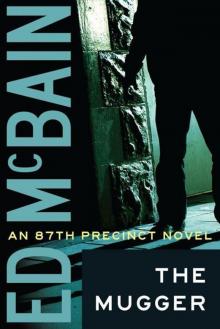 87th Precinct 02 - The Mugger
87th Precinct 02 - The Mugger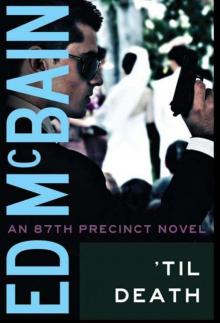 87th Precinct 09 - Til Death
87th Precinct 09 - Til Death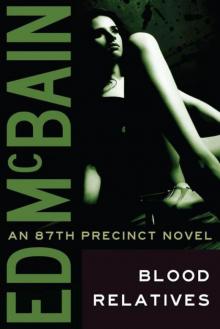 Blood Relatives (87th Precinct)
Blood Relatives (87th Precinct) Killer's Payoff
Killer's Payoff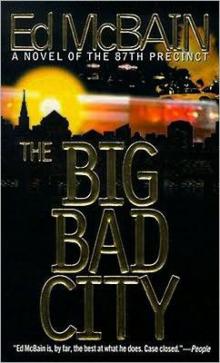 The Big Bad City
The Big Bad City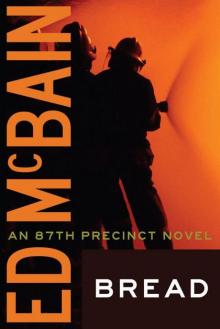 Bread (87th Precinct)
Bread (87th Precinct)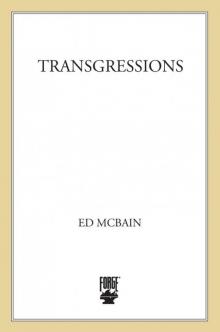 Transgressions Vol. 3
Transgressions Vol. 3 Runaway
Runaway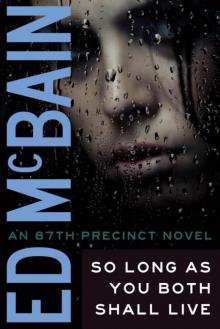 So Long As You Both Shall Live (87th Precinct)
So Long As You Both Shall Live (87th Precinct)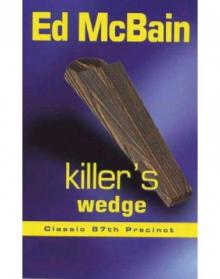 Killer's Wedge
Killer's Wedge